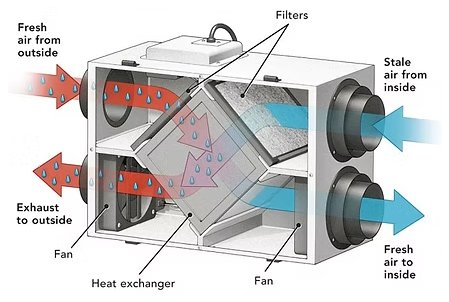Indoor Air Quality

Energy Recovery Ventilator (ERV)
Ideal for homes in Texas with mild winters and warmer climate, an ERV is installed in tandem with the HVAC system to transfer moisture and heat from incoming fresh air to the outgoing air stream—recovering energy that would otherwise be lost.
While stale air from your house is moved outside, the air inside your home is kept comfortable, fresh, clean—and no energy is wasted.
Transfers moisture and heat from incoming fresh air
Exhausts stale air while recovering energy
Whole-House Ventilation
We integrate Passive House features, such as whole-house filtered ventilation, which provide cleaner, healthier indoor air—but these systems only function properly in homes with a sealed, high-performance envelope like ours.
In a conventional home, air leaks through gaps in the construction, bringing in dust, allergens, humidity, and pollutants with no filtration. Our airtight building envelope eliminates uncontrolled air leakage, and the ERV ensures every breath of air entering your home passes through hospital-grade filtration—giving you complete control over your indoor environment.
Why It Matters
The EPA estimates that indoor air can be 2–5 times more polluted than outdoor air. In a net-zero home, the combination of an airtight envelope and mechanical ventilation with energy recovery means you get fresh, filtered air without the energy penalty of opening windows or running exhaust fans.
For Texas homeowners, this is especially important—keeping humidity controlled, pollen out, and indoor temperatures stable year-round without wasting energy.
